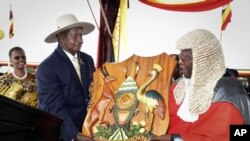Yoweri Museveni has begun his fifth term as Uganda’s president.
United States, Canadian and European delegates walked out of the official swearing-in ceremony on Thursday. They left to protest Museveni’s comments about the International Criminal Court.
The delegates also were protesting the presence of Sudanese President Omar al-Bashir at the inauguration.
Bashir is a war crimes suspect. The court has accused him of genocide and crimes against humanity in the Darfur area of Sudan. He returned home from Uganda late Thursday.
In Washington, a State Department official said the U.S. is “concerned that President Bashir has been able to travel to Uganda.”
The country is a member of the International Crime Court. As such, Uganda is supposed to detain and surrender to the court any indicted suspects on its soil.
In his speech Thursday, Yoweri Museveni openly voiced his lack of support for the court. Speaking to a number of African heads of state and other officials, the Ugandan leader said he no longer supports the court. He called its members, “a bunch of useless people.”
Underlying tension
Museveni has been in power since 1986. Before the inauguration, he arrived at Uganda’s Kololo Airstrip and received cheers from supporters. But the celebration took place against a setting of tension.
The government closed all social media websites the day before the swearing-in events. Police were deployed around Kampala, after unrest on Wednesday.
Opposition leader Kizza Besiyge had escaped from house arrest and made a surprise appearance. Besigye’s supporters gathered to see him. He promised to continue his campaign of defiance, and calls himself the “people's president.”
Police fired tear gas to break up the crowd and began beating civilians, according to witnesses and videos published on social media.
One storekeeper who was beaten said, "They [police] find us when we were closing the shop. They told us you close your shop, and we go." He said people became afraid and ran to nearby buildings.
Besigye finished in second place in the 2016 presidential election. He has called for an investigation of the election results.
Ugandan officials say Museveni won 61 percent of the votes.
The opposition FDC party said it held its own inauguration for Besiyge. The party released a video of the event on social media Wednesday. A short time later, the government cut social media links in the country.
This is the second time a social media blackout has been enforced. The first time was during the presidential election.
Many Ugandans avoided the social media ban by using VPNs or virtual private networks. Before the inauguration, Ugandans began warning friends on social media to make sure their VPN apps were current.
I’m Anne Ball.
Lizabeth Paulat wrote this story for VOANews.com. Jim Dresbach adapted her story for Learning English. George Grow was the editor.
We want to hear from you. Write to us in the Comments Section or visit our Facebook page.
________________________________________________________________
Words in This Story
walkout – n. the act of leaving a meeting or event as a way of showing disapproval
inauguration – n. a ceremony to introduce someone, such as a newly elected official, into a job or position
indicted – v. to formally decide that someone should be put on trial for a crime
shopkeeper – n. someone who owns or manages a shop or store
defiance – n. a refusal to obey something or someone
blackout – n. a situation in which some kinds of information are deliberately kept from the public
indicted – adj. of or relating to a legal ruling to try someone for a crime
bunch – n. a group








